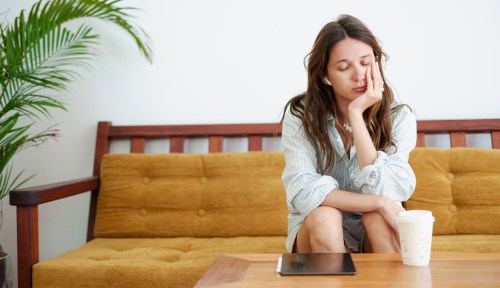There’s no denying it: A lot is coming at us recently that can affect our mental health. There are natural disasters, mass shootings, and of course, a pivotal national election creeping ever closer.
Experts in This Article
Fittingly, on World Mental Health Day, a nonprofit called Project Healthy Minds—which seeks to destigmatize the topic of mental health—today published the results of its 2024 Project Healthy Minds State of Mental Health Survey. The survey, conducted by The Harris Poll, involved 2,000 adults and asked about the top concerns affecting their mental state in the past year. The TL;DR is: You’re definitely not alone if the world is really stressing you out right now.
Here’s a closer look at what the survey uncovered about our collective worries, including what people are doing to cope.
Election anxiety is at an all-time high
The survey found 3 in 4 Americans (77 percent) have anxiety about the 2024 election. More than half (58 percent) say the election has had a negative effect on their mental health in the past year, and about 1 in 3 feel anxious about post-election fallout, no matter the result.
But thankfully, many of us are using healthy coping skills to keep election anxiety in check: The survey found 36 percent of us turn to exercise, 25 percent to extra sleep, and 21 percent to meditation as a means to deal with election stress. Setting boundaries when it comes to watching election news is another important strategy.
“Stay as connected as you need to be in order to engage in the democratic process, but also give yourself permission to disengage—unwinding and recharging will give you strength to face what comes next,” Betty Ford, PhD, associate professor of psychology at the University of Toronto, previously told Well+Good.
To calm news anxiety in the moment, therapist Natalie Moore suggests doing some deep breathing and taking a few minutes for mindfulness, where you focus your attention on physical sensations like what you can see, hear, feel, taste, and smell in that moment.
Financial uncertainty is also a top concern
Two-thirds of people surveyed say financial issues have hurt their mental health in the last year, with women (69 percent) more likely to be affected than men (62 percent).
This can be especially true for those who hold multiple jobs to stay afloat, or those who are part of the “sandwich generation,” i.e., adults who have both young children and aging parents to financially support.
Younger generations are more worried about extreme weather and mass shootings
About 53 percent of people surveyed said wildfires, hurricanes, and other natural disasters have negatively affected their mental health in the past year. And 60 percent say recent mass shootings have had a negative effect on their mental health over the last year, with women (67 percent) more likely to feel this way than men (53 percent).
Younger generations also view these challenges differently than older ones. For example, the survey found Gen Z and millennials are more likely than boomers to say mass shootings and finances negatively affected their mental health this year (65 and 63 percent versus 54 percent, respectively).
Social media increases anxiety in Gen Z folks
More than 2 in 5 Americans say social media had a negative effect on their mental health in the past year. Women are more likely to say that it’s affected them than men. In particular, Gen Z are more likely than millennials, Gen X, and boomers to say that social media had a negative impact on their mental state in the last year, per the survey.
Research has shown that scrolling through bad news on social media (aka, doomscrolling) is associated with increased anxiety and depression rates, per an October 2022 review in Applied Research in Quality of Life1. And recently, the U.S. Surgeon General Vivek Murthy, MD, even called for warning labels on social media2 platforms to protect adolescents’ mental well-being. Dr. Murthy also cited the complexities of managing social media as one of the factors driving sky-high levels of parental stress.
We need more mental health support
Lastly, Project Healthy Mind’s survey emphasizes the need for more mental health resources. Seventy-seven percent of people surveyed said they did not always seek mental health support when they needed it. About 2 in 5 people said it’s because it’s too expensive, while 1 in 5 said it’s because their healthcare provider did not take them seriously and 18 percent cited the stigma around getting help.
Many people also felt they don’t have enough time to seek help, the process is too complicated, and/or there is a lack of access to quality mental healthcare.
“We are releasing this data on World Mental Health Day to underscore how vital it is to address these intersecting issues before they take a deeper toll on our nation’s mental health,” said Project Healthy Mind’s CEO Phillip Schermer in the survey’s release. “Now is the time for innovative solutions and expanded access to mental health services.”
- Satici, Seydi Ahmet et al. “Doomscrolling Scale: its Association with Personality Traits, Psychological Distress, Social Media Use, and Wellbeing.” Applied research in quality of life vol. 18,2 (2023): 833-847. doi:10.1007/s11482-022-10110-7↩︎
Abbasi JHswen Y. US Surgeon General Vivek Murthy: To Protect Adolescents, Social Media Needs Warning Labels. JAMA. 2024;332(9):689–691. doi:10.1001/jama.2024.14245
↩︎
Sign Up for Our Daily Newsletter
Get all the latest in wellness, trends, food, fitness, beauty, and more delivered right to your inbox.
Got it, you've been added to our email list.











